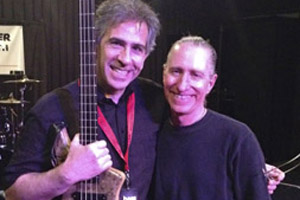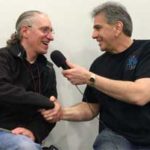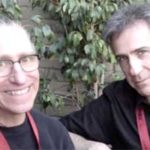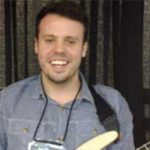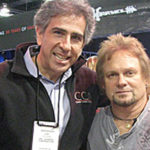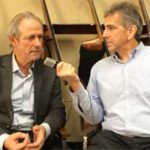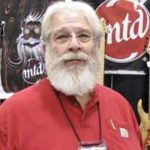Experiences with Jaco and the inherent risks of developing a solo bass act
Exclusive interview with FBPO’s Jon Liebman
September 19, 2011
Hailed by many as the world’s leading solo bassist, Michael Manring has been pushing back the boundaries of what’s possible on the bass guitar for over two decades. A student of bass legend Jaco Pastorius, Michael has honed his skills on hundreds of recordings and thousands of live shows around the world, working with a diverse collection of artists including the late guitar genius Michael Hedges, New Age keyboardist Suzanne Ciani, avant-improv guitar innovator Henry Kaiser, celebrated folk troubadour John Gorka, experimental post-metal rockers Tim Alexander (Primus) and Alex Skolnick (Testament) and electro-pop pioneer Thomas Dolby.
Manring has earned two gold records, GRAMMY and Bammie nominations, a Berklee College of Music Distinguished Alumni Award, two “Just Plain Folks” Awards and numerous Bass Player magazine Reader’s Poll awards, including Bassist of the Year in 1994. He currently focuses his energies on his innovative solo concerts, where he displays the expressive skills that led the San Jose Mercury News to call him “…a virtuoso electric bassist who’s almost single-handedly re-defined the outer limits of the instrument” and The Philadelphia Inquirer to refer to him as simply “…the hottest bassist today.”
FBPO: Tell me about your musical upbringing.
MM: My family was fairly musical. Three of my grandparents were serious musicians, so I guess it was in the gene pool. I became fascinated with the bass when I was about nine years old. In those days, though, information about music was a little harder to come by than it is today, so I didn’t know the name of the instrument that was catching my ear. My mom noticed my enthusiasm for music and signed me up for piano lessons, which I enjoyed a lot. It wasn’t long before I figured out the sound that really moved me was coming from a bass guitar. I begged my parents to let me buy one. They were a little reluctant, but they allowed me to rent one. Needless to say, that rental eventually turned into a purchase!
When I was a kid, I studied with a wonderful musician named Peter Princiotto, who was a big inspiration. We also had a great music program at the public high school I went to in Northern Virginia and I played in pretty much every ensemble they offered. I played in lots of local groups too, everything from garage rock to wedding bands to original groups to semi-pro big bands. My brother Doug is an amazing musician and I learned a lot playing with him. When I finished high school, I went to Berklee College of Music in Boston, but I was offered a full-time gig on the road at the end of my first year there, so after that I just kept working and didn’t manage to get any more schooling.
FBPO: What was the road gig?
MM: It was during the height of the disco era! It went out with a Top 40 band, playing “Boogie Oogie Oogie” and such. It was fun for a little while, but I realized it wasn’t the best fit for me. A few years after Berklee, I was living in New York City as your basic starving artist. While I was there, I studied a bit with Jaco Pastorius.
FBPO: We’ll come back to that in a minute! How did you end up as a bass player? Didn’t you start out studyingclassical, on the upright?
MM: I started like most of us, playing what was popular at the time: the Who, Jimi Hendrix, Sly & the Family Stone, Led Zeppelin and so on, but I got into jazz and fusion pretty early and started playing the upright when I was about 14. From there I got interested in classical music, contemporary music, ethnic music… I just soaked up lots of different sounds that appealed to me.
FBPO: How did you become established as a working musician?
MM: Getting involved with Windham Hill Records was probably what most helped me get a foot in the door in the mainstream of the music business. I started working with guitarist Michael Hedges when I was about 20 and he asked me to play on his demo tape for Windham Hill. I went out to California a few months later to play on Hedges’ first record and I guess the folks there liked what I played because they kept asking me to play on other records. Windham Hill was just getting started then, but it became quite successful. We played some big places, like Carnegie Hall, sold a lot of records, went to the GRAMMYs, etc. It was great fun!
FBPO: With all the session work you’ve done, what made you decide to venture out toward becoming, well, Michael Manring?!
MM: I guess my career path has been a little odd. I’ve been lucky enough to play on hundreds of recordings at this point. I lost track of how many after about three hundred. I do feel lucky because I learn something from each one. However, I never planned on being a session musician.
Right from the start, I was interested in playing the bass in ways that were outside the norm. The bass has always seemed to me to be a wonderful sort of sonic paintbrush and I love experimenting with it to see what’s possible. When I was a kid, everyone told me that’s not what bass is all about, that it was important to fill a particular role in music. That was fine with me because I love that conventional role, too.
As a teenager, I set out to get as good at being a straight-forward bassist as I could, but I couldn’t get these other sounds out of my head. I kept goofing with them on my own and, little by little, I got chances to try them out live and on recordings. In fact, contrary to what I expected, I found it was actually quite helpful to have a few extra tricks up my sleeve. I lot of folks I work with seem to like that I can bring some unusual sounds to the mix or play a couple of solo pieces in a show, in addition to keeping it straight when that’s called for.
FBPO: How would you describe what you do? I mean, your playing is not exactly conventional.
MM: I suppose my point-of-view is a bit unusual, but I just really love the bass guitar. My vision of the instrument is that we’re really just getting started with it and that its potential is mostly untapped. It’s an instrument of our time and place and that’s important to me because this is such an extraordinary time in history. I think of bass as my native voice and as an ideal vehicle for processing the most essential ideas in our culture. I’m just trying to make some sense of these complicated, wonderful, tragic, thrilling terrifying times we live in through the medium of music with this instrument that is so vital and relevant to me. That perspective leads me to keep searching and keeps me enthralled with a sense of possibility.
FBPO: You’ve managed to build a loyal following over the years and your audiences really seem to appreciate your shows (case in point: winter NAMM, 2011, where I was in the audience). Didn’t it feel risky to try to build an act around solo bass? Weren’t you afraid a lot of people just wouldn’t “get” it?
MM: I was certainly discouraged from pursuing solo bass by a lot of well-meaning, intelligent folks who didn’t think there would ever be an audience for it. I appreciated their advice and worked hard to make other kinds of music I enjoyed, but the solo bass thing just seemed to stick somehow. It’s odd, but the solo bass music I’ve done has been more successful than almost all other projects I’ve been involved in. I guess that’s just how people like to think of me and that’s fine because I’m absolutely passionate about it!
FBPO: I had the pleasure and the privilege of getting to know Jaco when I lived in Florida in the ’80s. Tell me about your experience with him. What did you learn from him that you still use today?
MM: Jaco was my idol when I was a young man and I was obsessed with his music. When I lived in New York in the early 1980s, I would go see him whenever I could. He often played at small venues and was relatively approachable, so I bugged him with lots of questions and asked him for lessons. He was actually interested in doing a fair bit of teaching in those days, so it wasn’t a hard sell.
As you know, Jaco was a complicated, troubled person, so spending time with him was a complex experience for me, both enlightening and confusing. Although he knew an enormous amount about music and wanted to teach, he didn’t have a method or teaching plan. That was okay with me because I had so many questions! By the time I sat down to study with him, I already had a pretty good understanding of the mechanics of his music, so I would often play something of his and ask him about it – a solo or bass line from one of his recordings. I was very interested in his tone and phrasing, so he showed me some of the fingerings he used and explained the ideas behind his approach. He also liked to play through standards together, so that was nice.
Jaco was always very kind to me and he was an amazing musician, but he was really struggling personally in those days. It was very tough to see someone I so admired that unhappy and disjointed. The experience caused me to do a lot of soul searching and, in the end, I think this helped set me off on my own path. Although I hope my music always reflects his influence, these days I don’t think about him that much or listen to his music very often. It’s certainly an important part of my musical personality, but I guess I’m just thinking more about moving forward.
FBPO: What’s keeping you busy these days?
MM: Things are very busy for me. I’m still doing a lot of session work. There are five recording projects I’m working on this month and a few collaborative recordings coming up as well. I tour off and on all over the world all year long, so a lot of my time is spent traveling and making travel plans. I try to make time for composing. I’m about halfway through a new solo record, but it’s always a struggle to find the time. My main focus is my family. Spending time with them is a joy and inspiration.
FBPO: What about the future? What else can we look forward to seeing and hearing from Michael Manring?
MM: I feel a little funny at this age to be still so engrossed with the bass, looking for new directions, striving for a deeper understanding, for a deeper musical sensibility, but that’s the way it is for me. I still feel like I did when I was a teenager! I won’t live long enough to explore all the ideas I want to, but I’ll do my best. Mostly it’ll be extensions of things I’ve been doing over the last several years: tunings, electronics, chords, rhythmic ideas, melodic approaches and
so on.
FBPO: What would you be if you weren’t a bass player?
MM: Actually, I didn’t set out to be a professional bass player. I’ve always loved the bass, but when I found out a little about the how the music business works, I really didn’t think I fit in. I wanted to be a teacher because that’s something I very much believe in, too. But I kept getting gigs and, after a while, it just seemed like I’d have to accept my second career choice! It’s probably for the best.
I have lots of interests, but not much time to pursue them. Mostly nerdy things, like yoga, literature, art, rhetoric, food, poetry, history, etc. I love to learn and try to understand who we are and where we’re going. It would be wonderful to be able to spend more time on all those things, but I can’t really imagine not playing the bass.
